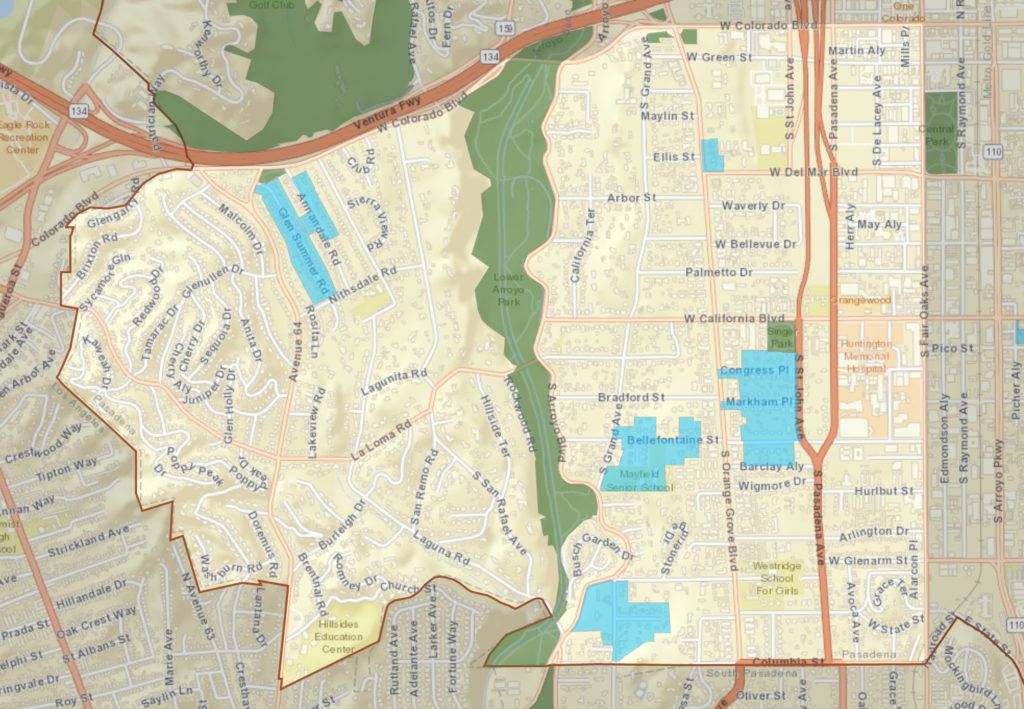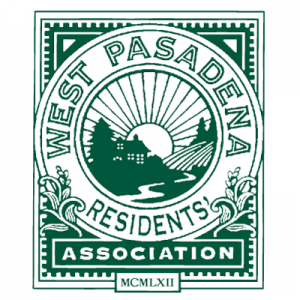Founded in 1962, the West Pasadena Residents’ Association is dedicated to maintaining and enhancing the character of our community and the quality of life in west Pasadena. The WPRA fulfills this mission by informing residents concerning current issues, representing the interests of our residents, and supporting the activities of others with whom we share interests. The involvements of the WPRA range from maintaining trees to maintaining city infrastructure, from traffic management to transportation, from architecture to development that enhances our community, and much more.
WPRA also welcomes support from anyone interested in the character or quality of life in our larger community.
The WPRA boundaries

WPRA represents more than 9000 residences of homeowners and renters, as well as businesses, schools, performance venues, recreation facilities, city facilities, and open space. We focus our efforts on the area of west Pasadena bounded by Colorado Boulevard on the north, Fair Oaks Avenue on the east, and the Pasadena city limits on the west and south.
We take interest in matters within a wide scope including Pasadena’s Civic Center, the Rose Bowl, the I-710 north stub, Pasadena Unified School District, public transportation and commercial constructions in other districts that may create adverse zoning precedent for greater density, height and massing of future structures within our own boundaries. We especially treasure our open and natural space of the Lower Arroyo Seco.
The WPRA publishes a quarterly newsletter for west Pasadena residents and hosts public forums and other events to keep our community informed about local issues.
What We Do and what we Don’t Do
What we do
The WPRA addresses civic issues of wide ranging concern in Pasadena and especially west Pasadena, such as:
Pasadena Traffic
- Tracking cumulative traffic effects and congestion of new local development
- Educating the public about the new measurements of vehicle trips and vehicle miles traveled
- Monitoring the “Complete Streets model” – all modes of transportation sharing the same road
Building Design
- Tracking contextual fit and massing of new homes and remodels according to zoning ordinances
- Pressing to maintain neighborhood residential and commercial building compatibility
- Fighting against “mansionization” – a house too big or out of character with surrounding homes
City Density
- Pressing to keep a balanced and managed growth
- Calling to action for an equitable distribution of all type of housing
- Campaigning for careful regulation and enforcement of zoning ordinances
Historic Preservation
- Striving to save specific landmark homes from demolition
- Participating with the designation and caring for historic neighborhoods
- Demanding the enforcement of historical and preservation codes
Parks and Open Spaces
- Securing the Arroyo Seco as a natural environment
- Lobbying to protect and preserve our current open spaces and urban forest
- Pressing for the acquisition of additional green spaces and parks
WPRA Information Channels for City Issues and Projects
- Disseminating local planning and regulation issues
- Explaining pending state regulation changes that affect Pasadena
- Staging presentations for public panel discussions and debates
710 Freeway Stub (The Vacant Dug Out Ravine)
- Recovering the west Pasadena land taken by Caltrans
- Pushing for balanced and wise development of that 52 acres
- Participating with the development for possible transit hub at Walnut and Fair Oaks
What we don’t do
Although the WPRA strives to preserve neighborhood identities and help our west side residents interact with city government, there are things we generally do not do.
We generally do not act as an arbitrator with disputes between individual homeowners.
We generally do not take a position on neighborhood/City conflicts outside our boundaries except when concerning the Civic Center, the Rose Bowl and a few other ‘Specific Plan’ areas of concern.
We do not endorse individual candidates running for public office. However, on occasion, we do stage public events where their ideas and platforms can be debated.
We don’t advertise or promote for-profit institutions and events in order to help them gain revenue.
We don’t support every civic objective or dispute thought to be beneficial or cause harm to one party or another. Our Board decides by vote which issues are included in our agenda.
